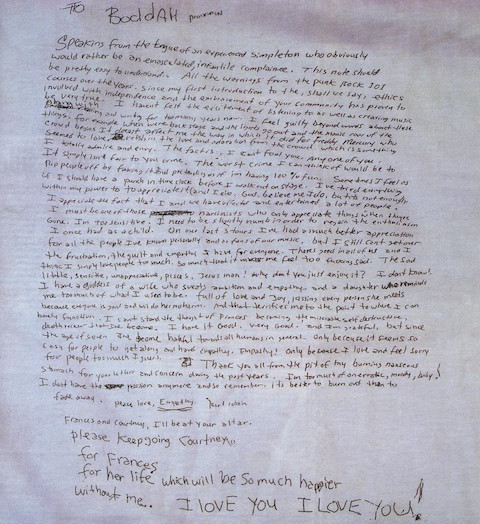Click for a larger image
Many people I grew up with had at one time or another a version of the crazy uncle of rock and roll Neil Young’s lyric at the ready, like an old man’s YOLO: “Better to burn out / than to fade away,” but most of us let go of our superficial embrace of the sentiment near the end of high school, realizing that too many of our heroes were dead or dying, and that we wanted to live. Sadly this was not the case for Kurt Cobain, who quoted Young’s line in his suicide note. Cobain died at age twenty-seven, but at the emotional age of a fragile, self-absorbed teenager, stunted by his addiction to heroin and a preternatural shyness he could not overcome. I was a senior in high school and although not much of a fan, I remember recoiling in horror from the almost religious devotion paid to Cobain after his suicide (not to mention the marketing). The perversity of the Kurt Cobain death cult lay precisely in the fact that his status as an icon at the end forced him deeper into a kind of shadow life. Cobain was constitutionally an anti-rock star who was somehow made to believe he was supposed to be Freddie Mercury.
Cobain mentions Mercury in his handwritten suicide note (top). It’s a disturbing text, disjointed but cogent, swinging wildly in tone but in theme mostly a note of painful, awkward self-consciousness, addressed not to his wife or daughter, but to his childhood imaginary friend, “Boddah.” The “manic roar of the crowds,” Cobain writes, “doesn’t affect me the way in which it did for Freddie Mercury,” whose “relish in the love and adoration” Cobain “totally admire[s].” He complains that performing feels like punching a clock, calls himself a “narcissist” and “too sensitive”: “The sad little, sensitive, unappreciative, Pisces.” Only later does he mention his daughter Frances, and only at the end by name, in a postscript that reads:
Frances and Courtney, I’ll be at your altar.
Please keep going Courtney,
for Frances
for her life which will be so much happier
without me.
Read a full transcript of the letter on reddit. Courtney has indeed kept going, though accused of cashing in on Kurt’s legacy, and even of planning his death in a number of conspiracy theories (many involving that postscript). Above, you can hear her mourning Cobain with fans and reading his final note. It’s difficult listening, without a doubt. Whatever anyone inclines to think about the circumstances of Cobain’s death, there’s no question he was burned out—deeply depressed and heavily addicted—and getting on stage night after night didn’t help. Neil Young wrote of Cobain’s death in his recent autobiography, Waging Heavy Peace. “I, coincidentally, had been trying to reach him. I wanted to talk to him. Tell him only to play when he felt like it.” Despite previously avoiding the question, Young admits that was haunted by Cobain’s reference to the burn out, fade away lyric from “My My, Hey Hey (Out of the Blue).” Like many people, it’s hard for me to hear that song and not think of Cobain’s far too literal embodiment of the words.
Related Content:
Nirvana’s Home Videos: An Intimate Look at the Band’s Life Away From the Spotlight (1988)
Kurt Cobain’s Isolated Vocal Track From ‘Smells Like Teen Spirit,’ 1991
Patti Smith’s Cover of Nirvana’s “Smells Like Teen Spirit” Strips the Song Down to its Heart
Josh Jones is a writer and musician based in Durham, NC. Follow him at @jdmagness



much love.
Never heard the note before. What a clown, the whole lot of ’em.
Wonder what parallels you could draw between Kurt Cobain and Holden Caulfield…
Kurt was a hero heroes die young. He was brave. He met death with all his heart. All my love to you Kurt wherever you are. Kisses
Josh It must have been difficult to write this article. A sad man, a sad life.
Thanks
ema